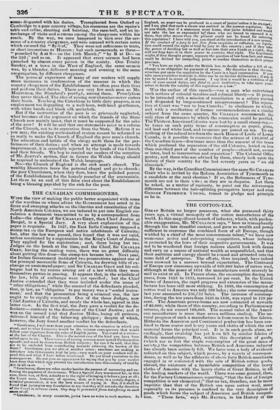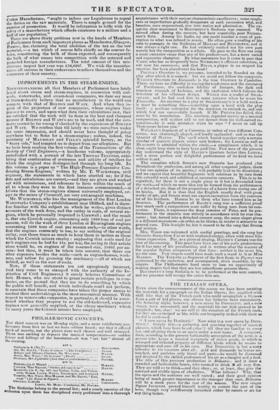THE COTTON-TAX.
GREAT Britain no longer possesses, what she possessed thirty years ago, a virtual monopoly of the cotton manufacture of the world. In this magnificent branch of industry, which, with pardon- able exaggeration, Mr. M'CuaLocH says, " bore us triumphantly through the late dreadful contest, and gave us wealth and power sufficient to overcome the combined force of all Europe, though wielded by a chief of the most consummate talent," we have now numerous active and enterprising competitors, whose industry is protected by the laws of their respective governments. It was not to be wondered that foreign nations should look with desire and envy on a source of national wealth so unparalleled, and that their ambition and energy should be roused and attracted into the same field of enterprise. The efforts, thus inspired, have indeed been crowned by a success beyond expectation. The Continent of Europe now consumes upwards of 600,000 bales of cotton wool, although at the peace of 1814 the manufacture could scarcely be said to exist at all. In France alone, the consumption during ten years, from 1823 to 1833, increased 58 per cent. In the United States of America, the rapid progress and extension of the manu- facture has been still more striking. In 1808, the consumption of cotton wool in America was only 100 bales ; the same consumption last year amounted to 236,733 hales. The increase of consump- tion, during the ten years from 1826 to 1836, was equal to 120 per cent. The American power-looms are now estimated at upwards of 40,000; while those of this country, according to Parliamentary returns, do not exceed 100,000. The annual value of the Ameri- can manufacture is more than seven millions sterling. The na- tural progress of such a manufacture is from coarse to fine fabrics. Hitherto the American and Continental production has been con- fined to those coarse and heavy yarns and cloths of which the raw material forms the principal cost. It is in such goods alone, ac- cordingly, that rivalship has yet le2en felt by similar fabrics of British manufacture. But, within this description of goods, (which are in fact the staple consumption of the great mass of society,) the competition between British and American industry has already been seriously felt. We have seen a body of evidence collected on this subject, which proves, by a variety of correspon- dence, as well as by the affidavits of above forty British merchants engaged in or connected with the sale of British cotton gouda, abroad, the existence of a formidable competition of the heavy cloths of America with the heavy cloths of Great Britain, in all the leading markets of the world. There was some ground, then, for the Factory Commissioners reporting, " that the fear of foreign competition is not chimerical ;" that no tax, therefore, can be more impolitic than that of the British one upon cotton wool, more especially as its pressure is confined to the very description of goods which forms the subject of American and British competi- tion. "These. facts," says Mr. BAINES, in his History of the Colton Manufacture, "ought to induce our Legislature to repeal the duties on the raw materials. There is ample ground for the exercise of precaution. It would be infatuation to trifle with the safety of a manufacture which affords existence to a million and a half of our population."
There are above thirty petitions now in the hands of Members of Parliament from such important places as Manchester, Glasgow, Prestoa, &c. claiming the total abolition of the tax on the raw material,— a tax which of course falls chiefly on the coarser fa- brics, constituting the bulk of those exported, and consequently the bulk of what comes into competition with the untaxed and protected foreign manufactures. The total amount of this mis- chievous impost last year was 430,000/. We wish the manufac- turers all success in their endeavours to relieve themselves and the commerce of their country.



























 Previous page
Previous page